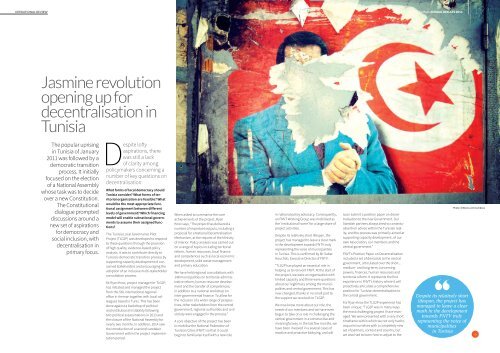ANNUAL RESULTS 2014
Create successful ePaper yourself
Turn your PDF publications into a flip-book with our unique Google optimized e-Paper software.
OPERATIONAL REVIEW<br />
SKL INTERNATIONAL <strong>ANNUAL</strong> <strong>RESULTS</strong> <strong>2014</strong><br />
19<br />
Jasmine revolution<br />
opening up for<br />
decentralisation in<br />
Tunisia<br />
The popular uprising<br />
in Tunisia of January<br />
2011 was followed by a<br />
democratic transition<br />
process. It initially<br />
focused on the election<br />
of a National Assembly<br />
whose task was to decide<br />
over a new Constitution.<br />
The Constitutional<br />
dialogue prompted<br />
discussions around a<br />
new set of aspirations<br />
for democracy and<br />
social inclusion, with<br />
decentralisation in<br />
primary focus.<br />
Despite lofty<br />
aspirations, there<br />
was still a lack<br />
of clarity among<br />
policymakers concerning a<br />
number of key questions on<br />
decentralisation:<br />
What forms of local democracy should<br />
Tunisia consider? What forms of territorial<br />
organisation are feasible? What<br />
would be the most appropriate functional<br />
assignment between different<br />
levels of government? Which financing<br />
model will enable subnational governments<br />
to assume their assigned functions?<br />
The Tunisia Local Governance Pilot<br />
Project (TLG2P) was developed to respond<br />
to these questions through the provision<br />
of high quality, evidence-based policy<br />
analysis. It was to contribute directly to<br />
Tunisia’s democratic transition process by<br />
supporting capacity development of concerned<br />
stakeholders and encouraging the<br />
adoption of an inclusive multi-stakeholder<br />
consultation process.<br />
Mr Ryan Knox, project manager for TLG2P,<br />
has initiated and managed the project<br />
from the SKL International regional<br />
office in Amman together with local colleagues<br />
based in Tunis. This has been<br />
done against a backdrop of political<br />
and institutional instability following<br />
two political assassinations in 2013 and<br />
the closure of the National Assembly for<br />
nearly two months. In addition, <strong>2014</strong> saw<br />
the introduction of a second caretaker<br />
Government within the project implementation<br />
period.<br />
When asked to summarise the core<br />
achievements of the project, Ryan<br />
Knox says; “The project has delivered a<br />
number of important outputs, including a<br />
proposal for a National Decentralisation<br />
Mechanism, at the request of the Ministry<br />
of Interior. Policy analysis was carried out<br />
on a range of topics including territorial<br />
reform, human resources, local finance<br />
and competences such as local economic<br />
development, solid waste management<br />
and primary education.<br />
We have held regional consultations with<br />
148 municipalities on territorial-administrative<br />
reform, human resource development<br />
and the transfer of competences,<br />
in addition to a national workshop on<br />
inter-governmental finance. To allow for<br />
the inclusion of a wider range of perspectives,<br />
other stakeholders from the central<br />
government, regional authorities and civil<br />
society were engaged in the process.”<br />
A core objective of the project has been<br />
to mobilise the National Federation of<br />
Tunisian Cities (FNVT) so that it could<br />
begin to familiarise itself with a new role<br />
in national policy advocacy. Consequently,<br />
an FNVT Working Group was mobilised as<br />
the ‘institutional home’ for a large share of<br />
project activities.<br />
Despite its relatively short lifespan, the<br />
project has managed to leave a clear mark<br />
in the development towards FNTV truly<br />
representing the voice of municipalities<br />
in Tunisia. This is confirmed by Mr Saber<br />
Houchati, Executive Director of FNTV:<br />
“TLG2P has played an essential role in<br />
helping us to reinvent FNVT. At the start of<br />
the project, we were an organisation with<br />
limited capacity and there were questions<br />
about our legitimacy among the municipalities<br />
and central government. This has<br />
now changed, thanks in no small part to<br />
the support we received on TLG2P.<br />
We now know more about our role, the<br />
needs of our members and we have even<br />
begun to take on a role in challenging the<br />
central government in a constructive and<br />
meaningful way. In the last few months, we<br />
have been involved in a several cases of<br />
reactive and proactive lobbying, and will<br />
soon submit a position paper on decentralisation<br />
to the new Government. Our<br />
Swedish partners always tried to contextualise<br />
their advice within the Tunisian reality,<br />
and the process was primarily aimed at<br />
supporting capacity development, of our<br />
own Association, our members and the<br />
central government.”<br />
FNVT’s Position Paper on Decentralisation<br />
included a set of demands to the central<br />
government, articulated over the short-,<br />
medium- and long-term, concerning<br />
powers, finances, human resources and<br />
territorial reform. It represents the first<br />
experience in FNVT’s history where it will<br />
proactively articulate a comprehensive<br />
position for Tunisian decentralisation to<br />
the central government.<br />
For Ryan Knox the TLG2P experience has<br />
been unique; “TLG2P was in many ways<br />
the most challenging project I have managed.<br />
We were presented with a very short<br />
timeframe within which we not only had to<br />
acquaint ourselves with a completely new<br />
set of partners, context and country, but<br />
we also had to learn how to adjust to the<br />
Despite its relatively short<br />
lifespan, the project has<br />
managed to leave a clear<br />
mark in the development<br />
towards FNTV truly<br />
representing the voice of<br />
municipalities<br />
in Tunisia<br />
Photo: ©iStock.com/numbeos<br />
→


